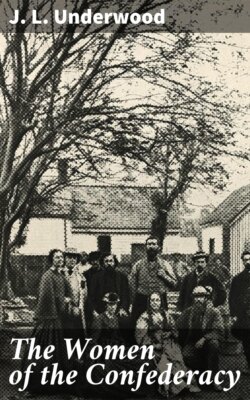Читать книгу The Women of the Confederacy - J. L. Underwood - Страница 18
На сайте Литреса книга снята с продажи.
TRIBUTE OF DR. J. L. M. CURRY
ОглавлениеTable of Contents
[Civil History of the Confederate States, pages 171-174.]
We hear and read much of delicately pampered “females” in ancient Rome and modern Paris and Newport, but in the time of which I speak in this Southland of ours, womanhood was richly and heavily endowed with duties and occupations and highest social functions, as wife and mother and neighbor, and these responsibilities and duties underlay our society in its structure and permanence as solid foundations. Instead of superficial adornments and supine inaction, the intellectual sympathies and interests of these women were large, and they undertook, with wise and just guidance, the management of household and farms and servants, leaving the men free for war and civil government. These noble and resolute women were the mothers of the Gracchi, of the 27 men who built up the greatness of the Union and accomplished the unexampled achievements of the Confederacy. Knowing no position more exalted and paramount than that of wife and mother, with the responsibilities which attach to miniature empire, the training of children and guidance of slaves, each one was as Caesar would have had his companion, above reproach and above suspicion; and whose purity was so prized that a violation of personal dignity was resented and punished, by all worthy to be sons and husbands and fathers of such women, with the death of the violator. “Strength and dignity were her clothing; she opened her mouth with wisdom, and the law of kindness was on her tongue. She looked well to the ways of her household, and she ate not the bread of idleness. Her children rose up and called her blessed; her husband also.”
When inequality was threatened and States were to be degraded to counties, and the South became one great battlefield, and every citizen was aiding in the terrible conflict, the mothers, wives, sisters, daughters, with extraordinary unanimity and fervor, rallied to the support of their imperilled land. While the older women from intelligent conviction were ready to sustain the South, political events and the necessity of confronting privations, trials, and sorrows developed girlhood into the maturity and self-reliance of womanhood. Anxious women with willing hands and loving hearts rushed eagerly to every place which sickness or destitution or the ravages of war invade, enduring sacrifices, displaying unsurpassed fortitude and heroism. Churches were converted into hospitals or places for making, collecting, and shipping clothing and needed supplies. Innumerable private homes adjacent to battlefields were filled with the sick and wounded. It was not uncommon to see grandmother and youthful maiden engaged in making socks, hats, and other needed articles. Untrained, these women entered the fields of labor with the spirit of Christ, rose into queenly dignity, and enrolled themselves among the immortals.
28
